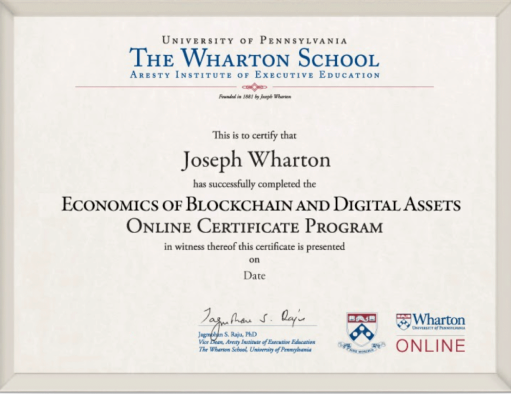.jpeg)
Blockchain technology is taking the professional and cultural world by storm. This promising technology uses decentralized computation and cryptographic technologies to verify ownership of digital assets. Many have taken an interest in the technology because of the paradoxical combination of transparency and security.
The ethos of this technology is fiercely interesting to those working in finance, risk mitigation, and asset management. Due to the immense potential, many developers, managers, and executives are looking for authoritative courses to learn about the nascent technology. Many blockchain neophytes have turned to the Wharton School for a clear-minded blockchain certification.
There are a few different certification focuses depending on the vocation of the prospective student. For example, those who work in backend development will want to take a blockchain certification course that focuses on blockchain development languages and heuristics.
On the other hand, those who work in finance will want to understand blockchain technology's opportunities and challenges. This knowledge will be invaluable when consulting with clients and managing their assets. Finally, managers and company leaders need a blockchain certification course that focuses on streamlined operations, supply chain management, contracts, and payments. Wharton’s blockchain course, for example, takes a deep dive into smart contracts, DeFi, traditional finance, decentralized lending, and more. This course is geared towards individuals who work directly in finance and upper management who want to know how blockchain may affect them, their clients, and their companies.
Blockchain technology was created to be a sort of decentralized financial ledger. However, the technology has grown and now encompasses many different use cases. Developers are responsible for practically applying blockchain technology in different industries like finance, insurance, and risk management. Since blockchain uses immutable data and concepts like proof of work and proof of stake, developers can mold blockchain technology to fit a number of different functions.
Courses for developers should provide a proper understanding of the different languages germane to blockchain. In addition, students of these courses should also understand the basic philosophy behind blockchain, distributed systems, cryptography, proof of work, and proof of stake.
There are two roles that blockchain may play within finance. First are the cryptocurrencies that nearly everyone is aware of. Second is the actual technology, which can drastically improve the security of transactions, payments, and registries.
While the latter falls more in the developer's domain, the former has at least piqued the interest of many financial advisors, CFOs, and other finance professionals. Digital blockchain assets such as bitcoin, Ethereum, and others may appear as speculative assets at first blush. However, the technology and philosophy that undergird cryptocurrencies oblige us to rethink the future of money.
Finally, C-suites and managers may take a keen interest in blockchain technology and wish to enroll in a blockchain certification course. Blockchain can help businesses streamline operations and permit access to sensitive information in a trustless system. Contracts between companies can also be memorialized on the blockchain and automatically executed to improve revenue and trust between companies.
Blockchain certification courses should cover the architecture of how the technology works and other foundational ideas. However, depending on the professional and the role an employee occupies, there are essential topics that the course must address. For example, ideas like risk mitigation, finance tactics, and asset management are of special interest to those working in finance and similar fields.
Blockchain’s capacity to manage risk is an essential part of the technology and is, therefore, a crucial part of any professional certificate. The first use case of blockchain (Bitcoin) was criticized for its lack of efficiency. The original code and succeeding generations begin with the default assumption that any contact is hostile until proven otherwise. This default assumption is a departure from the norm of trusted internal databases.
Blockchain solves the problem of hostility with its consensus mechanism; if and only if other nodes display the same data, then a computational process may be executed. This risk mitigation allows data stored on the blockchain to be immutable (unchangeable) and memorialized in perpetuity. This risk mitigation helps prevent financial fraud, unauthorized access to information, and other hostile data attacks.
Because blockchain found its inception in a digital cryptocurrency, a blockchain certificate course should cover the basics of finance applied to cryptocurrencies. These digital monies are new and therefore volatile compared to most of the world’s currencies, stocks, bonds, and other investment vehicles or media of exchange.
Financial advisors will learn about the role of cryptocurrencies within an investment portfolio and how to manage the risk and benefit that these digital monetary assets exhibit. Financial advisors will also glean knowledge of the future of blockchain finance, like widespread adoption and government regulation.
Even outside of cryptocurrencies, blockchain is changing how assets are managed. For example, distributed ledger technology (DLT) adds an extra dimension of high security to digital assets. While these assets can be cryptocurrency, they can also be more traditional investment vehicles like ETFs.
Asset managers and leadership at asset management companies will learn how blockchain can increase security, operational efficiency, and regulatory compliance. Additionally, blockchain can ensure secure onboarding processes by encrypting and anonymizing data. Operational efficiency can improve by implementing smart contracts with self-executing code. Finally, regulatory compliance can be built right into a blockchain investment account such that taxes are automatically calculated and paid.
A blockchain course certainly can be worth the investment. C-suite and upper management who work for companies that rely heavily on computation would be well-served with a blockchain course. Blockchain looks promising when it comes to new revenue streams, increased efficiency, and security. Individuals who are interested in switching careers or companies will likely also benefit from a blockchain course and increased job opportunities. Finally, entrepreneurial spirits looking for niches in different industries may find a treasure trove of information in a blockchain certification.
It’s highly recommended that the student consider the reputation of the institution offering the certification. Many unscrupulous blockchain companies offer "certifications" that are actually part of a sales funnel to promote investment in their blockchain company.
Unlike these questionable courses, Wharton offers one of the world's most lauded blockchain certification courses. Our highly credentialed professors have been studying blockchain since its earliest days and are experts in other adjacent industries like computation and economics. Wharton focuses on equipping the next generation of blockchain leaders who will shape and transform their industries with their first-class education. To learn more about Wharton’s Economics of Blockchain and Digital Assets course, please visit our information page.
This article is for marketing purposes only and does not intend to represent the opinions of the program.


